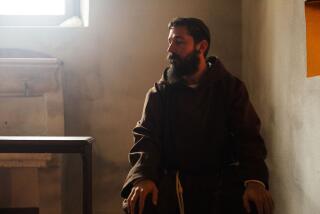Catholic Female Priest Says Vows
- Share via
Giovanna M. Piazza’s dream is to sing backup with the Rolling Stones. Her calling is to be a priest, one that she fulfilled Saturday when she was ordained as the first Catholic woman priest in Orange County.
Piazza, 40, became the third woman priest in the Diocese of Ecumenical, Old Catholic Faith Communities, a small offshoot of the Catholic faith, with about 300 members in the area and half a million worldwide. Although observing the same sacraments and professing many of the core values as the Roman Catholic Church, the congregation diverges in its beliefs about divorce, sexual orientation, and the exclusion of people from other denominations during Holy Communion. It also allows married men and women to become priests.
As members from her congregation of St. Matthew Ecumenical Church placed the stole, a symbol of priesthood, around her shoulders, Piazza was fulfilling her duty as well as her lifetime aspiration.
“This is something that’s beyond me,” Piazza said. “I have put it aside and walked away from it several times, but this is something I’ve been called to do. This is a mantle of responsibility.”
For some, Piazza’s ordination is a symbol of reformation at a time when the Catholic Church needs it most.
Some Say the Time Is Right for Such an Event
“It’s an event that is long overdue,” said Christina Buismato, 66, a Roman Catholic who came to the ordination with a friend. “At a time in which our church is going through so many horrible things, this is a bright event.”
Although Buismato said she will not leave the Roman Catholic Church, she said it’s time for the church to stop treating woman as second-class citizens.
Piazza’s ordination was held at St. Mark Presbyterian Church in Newport Beach so there would be room for the more than 100 people who attended. The celebration opened with chants of joy to the beat of drums. Piazza walked the church’s aisle, applauding, a tissue in her right hand, her eyes overflowing as she reached the altar.
The ceremony built up to the moment when Piazza lay face down on the altar, wrapped in a white mantle as part of the ritual of prostration.
“I was praying, thinking about all of the responsibility that came with the ordination,” she said about the moving moment. It was followed by the passing on of the priest’s mantle, a vestment of colorful fibers from people in the congregation.
As a devout Roman Catholic, Piazza spent 35 years trying to find herself in the church. She said she has felt the calling to become a priest since she was a child. Even when she knew that it was not a possibility under the Roman Catholic Church, she prepared herself to pursue a religious path. She studied theology at Benedictine College In Atchison, Kan., and earned a master’s of divinity degree from Yale University.
Five years ago, she realized that her values diverged from those of the Catholic Church, she said, and she felt compelled to leave. She said she could not belong to a religion that excluded “so many people,” including divorced couples and homosexuals, and that did not allow married men and women to be ordained.
“Any one issue might not have been sufficient to take me out of the church,” she said.
“That would have been myopic. It was a combination of all of them.”
Reform Is Catching On, Group’s Leader Says
Piazza’s ideology is catching on among Roman Catholics eager for reform said the group’s bishop, Peter Hickman.
“The days are numbered for an exclusively male Catholic priesthood,” he said.
“And not to mention a celibate one. The Holy Spirit is talking to the Catholic Church through us.”
Many theologians see efforts such as Piazza’s ordination as a step in the right direction.
“For us to expect that this would have a great impact on the church would be unrealistic,” said Marvin Meyer, religion department chairman at Chapman University.
“But if the Roman Catholic Church is going to survive, this has to be the wave of the future.”
Piazza said many changes within the Catholic Church will come within the life spans of today’s children.
“They won’t know that there were not any women priests,” she said, referring to two girls who came to hug her.
“They will see God in women in the same way they see God in man. That’s a good thing for our society, not just for our church.”


